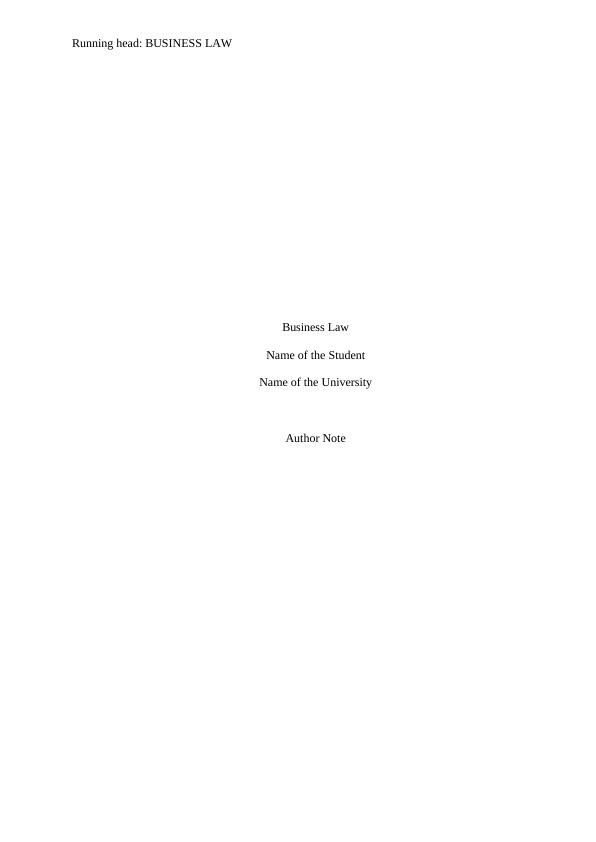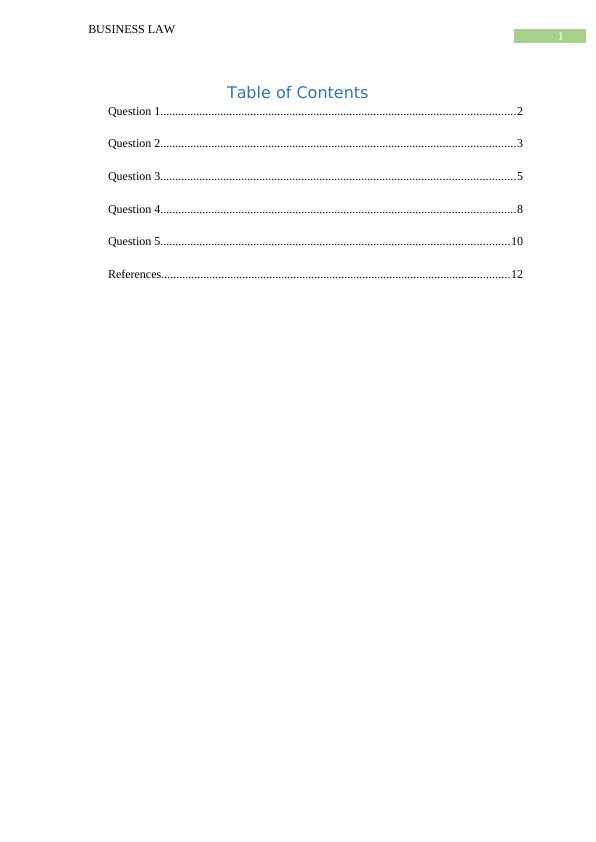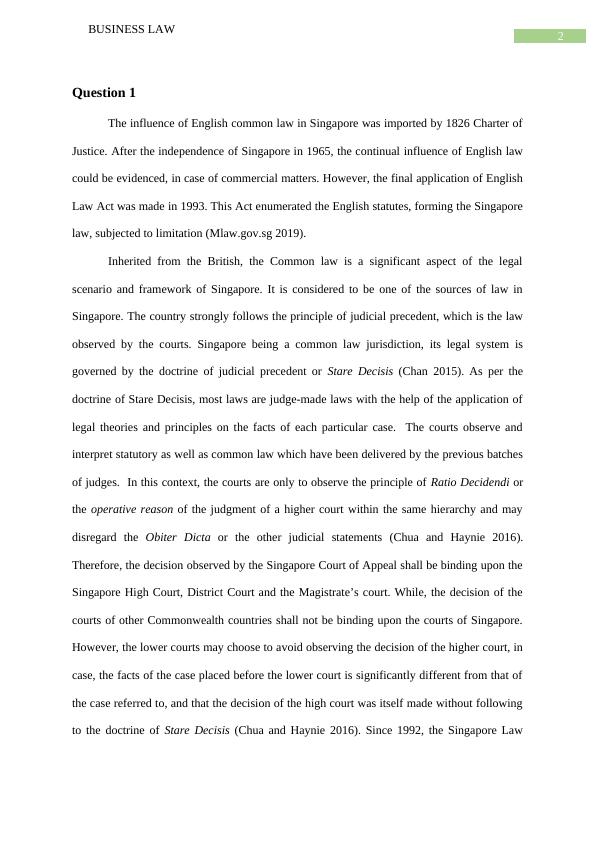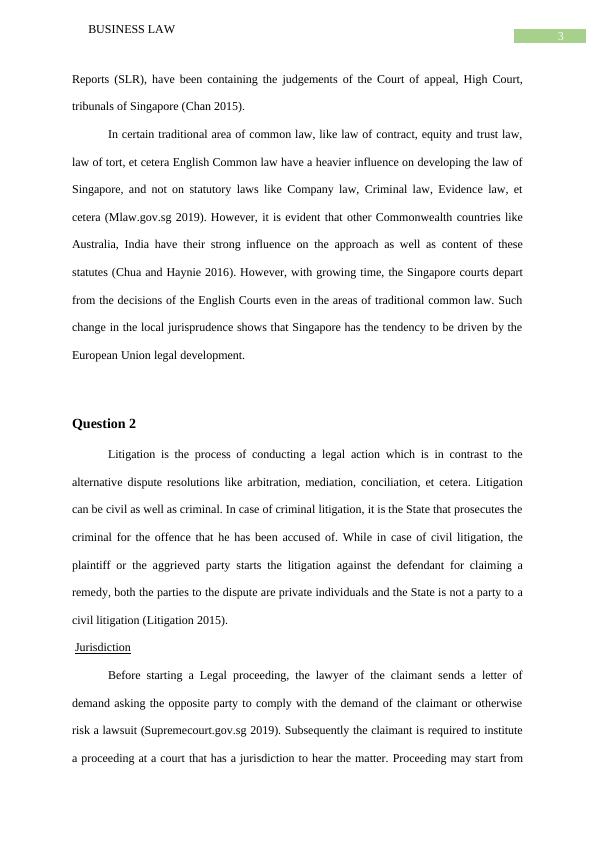Influence of English Common Law in Singapore
Added on 2023-03-31
14 Pages3029 Words371 Views
Running head: BUSINESS LAW
Business Law
Name of the Student
Name of the University
Author Note
Business Law
Name of the Student
Name of the University
Author Note

1
BUSINESS LAW
Table of Contents
Question 1......................................................................................................................2
Question 2......................................................................................................................3
Question 3......................................................................................................................5
Question 4......................................................................................................................8
Question 5....................................................................................................................10
References....................................................................................................................12
BUSINESS LAW
Table of Contents
Question 1......................................................................................................................2
Question 2......................................................................................................................3
Question 3......................................................................................................................5
Question 4......................................................................................................................8
Question 5....................................................................................................................10
References....................................................................................................................12

2
BUSINESS LAW
Question 1
The influence of English common law in Singapore was imported by 1826 Charter of
Justice. After the independence of Singapore in 1965, the continual influence of English law
could be evidenced, in case of commercial matters. However, the final application of English
Law Act was made in 1993. This Act enumerated the English statutes, forming the Singapore
law, subjected to limitation (Mlaw.gov.sg 2019).
Inherited from the British, the Common law is a significant aspect of the legal
scenario and framework of Singapore. It is considered to be one of the sources of law in
Singapore. The country strongly follows the principle of judicial precedent, which is the law
observed by the courts. Singapore being a common law jurisdiction, its legal system is
governed by the doctrine of judicial precedent or Stare Decisis (Chan 2015). As per the
doctrine of Stare Decisis, most laws are judge-made laws with the help of the application of
legal theories and principles on the facts of each particular case. The courts observe and
interpret statutory as well as common law which have been delivered by the previous batches
of judges. In this context, the courts are only to observe the principle of Ratio Decidendi or
the operative reason of the judgment of a higher court within the same hierarchy and may
disregard the Obiter Dicta or the other judicial statements (Chua and Haynie 2016).
Therefore, the decision observed by the Singapore Court of Appeal shall be binding upon the
Singapore High Court, District Court and the Magistrate’s court. While, the decision of the
courts of other Commonwealth countries shall not be binding upon the courts of Singapore.
However, the lower courts may choose to avoid observing the decision of the higher court, in
case, the facts of the case placed before the lower court is significantly different from that of
the case referred to, and that the decision of the high court was itself made without following
to the doctrine of Stare Decisis (Chua and Haynie 2016). Since 1992, the Singapore Law
BUSINESS LAW
Question 1
The influence of English common law in Singapore was imported by 1826 Charter of
Justice. After the independence of Singapore in 1965, the continual influence of English law
could be evidenced, in case of commercial matters. However, the final application of English
Law Act was made in 1993. This Act enumerated the English statutes, forming the Singapore
law, subjected to limitation (Mlaw.gov.sg 2019).
Inherited from the British, the Common law is a significant aspect of the legal
scenario and framework of Singapore. It is considered to be one of the sources of law in
Singapore. The country strongly follows the principle of judicial precedent, which is the law
observed by the courts. Singapore being a common law jurisdiction, its legal system is
governed by the doctrine of judicial precedent or Stare Decisis (Chan 2015). As per the
doctrine of Stare Decisis, most laws are judge-made laws with the help of the application of
legal theories and principles on the facts of each particular case. The courts observe and
interpret statutory as well as common law which have been delivered by the previous batches
of judges. In this context, the courts are only to observe the principle of Ratio Decidendi or
the operative reason of the judgment of a higher court within the same hierarchy and may
disregard the Obiter Dicta or the other judicial statements (Chua and Haynie 2016).
Therefore, the decision observed by the Singapore Court of Appeal shall be binding upon the
Singapore High Court, District Court and the Magistrate’s court. While, the decision of the
courts of other Commonwealth countries shall not be binding upon the courts of Singapore.
However, the lower courts may choose to avoid observing the decision of the higher court, in
case, the facts of the case placed before the lower court is significantly different from that of
the case referred to, and that the decision of the high court was itself made without following
to the doctrine of Stare Decisis (Chua and Haynie 2016). Since 1992, the Singapore Law

3
BUSINESS LAW
Reports (SLR), have been containing the judgements of the Court of appeal, High Court,
tribunals of Singapore (Chan 2015).
In certain traditional area of common law, like law of contract, equity and trust law,
law of tort, et cetera English Common law have a heavier influence on developing the law of
Singapore, and not on statutory laws like Company law, Criminal law, Evidence law, et
cetera (Mlaw.gov.sg 2019). However, it is evident that other Commonwealth countries like
Australia, India have their strong influence on the approach as well as content of these
statutes (Chua and Haynie 2016). However, with growing time, the Singapore courts depart
from the decisions of the English Courts even in the areas of traditional common law. Such
change in the local jurisprudence shows that Singapore has the tendency to be driven by the
European Union legal development.
Question 2
Litigation is the process of conducting a legal action which is in contrast to the
alternative dispute resolutions like arbitration, mediation, conciliation, et cetera. Litigation
can be civil as well as criminal. In case of criminal litigation, it is the State that prosecutes the
criminal for the offence that he has been accused of. While in case of civil litigation, the
plaintiff or the aggrieved party starts the litigation against the defendant for claiming a
remedy, both the parties to the dispute are private individuals and the State is not a party to a
civil litigation (Litigation 2015).
Jurisdiction
Before starting a Legal proceeding, the lawyer of the claimant sends a letter of
demand asking the opposite party to comply with the demand of the claimant or otherwise
risk a lawsuit (Supremecourt.gov.sg 2019). Subsequently the claimant is required to institute
a proceeding at a court that has a jurisdiction to hear the matter. Proceeding may start from
BUSINESS LAW
Reports (SLR), have been containing the judgements of the Court of appeal, High Court,
tribunals of Singapore (Chan 2015).
In certain traditional area of common law, like law of contract, equity and trust law,
law of tort, et cetera English Common law have a heavier influence on developing the law of
Singapore, and not on statutory laws like Company law, Criminal law, Evidence law, et
cetera (Mlaw.gov.sg 2019). However, it is evident that other Commonwealth countries like
Australia, India have their strong influence on the approach as well as content of these
statutes (Chua and Haynie 2016). However, with growing time, the Singapore courts depart
from the decisions of the English Courts even in the areas of traditional common law. Such
change in the local jurisprudence shows that Singapore has the tendency to be driven by the
European Union legal development.
Question 2
Litigation is the process of conducting a legal action which is in contrast to the
alternative dispute resolutions like arbitration, mediation, conciliation, et cetera. Litigation
can be civil as well as criminal. In case of criminal litigation, it is the State that prosecutes the
criminal for the offence that he has been accused of. While in case of civil litigation, the
plaintiff or the aggrieved party starts the litigation against the defendant for claiming a
remedy, both the parties to the dispute are private individuals and the State is not a party to a
civil litigation (Litigation 2015).
Jurisdiction
Before starting a Legal proceeding, the lawyer of the claimant sends a letter of
demand asking the opposite party to comply with the demand of the claimant or otherwise
risk a lawsuit (Supremecourt.gov.sg 2019). Subsequently the claimant is required to institute
a proceeding at a court that has a jurisdiction to hear the matter. Proceeding may start from

End of preview
Want to access all the pages? Upload your documents or become a member.
Related Documents
Duties of a Director under Singapore Companies Actlg...
|10
|2991
|344
Understanding the Doctrine of Stare Decisis in Civil Lawlg...
|9
|2358
|488
Contract Lawlg...
|11
|2629
|80
In England and Wales the legallg...
|14
|3952
|21
The Significance of the Doctrine of Stare Decisis in the Development of Lawlg...
|6
|1857
|192
Constitution and Administrative Lawlg...
|7
|1291
|146
